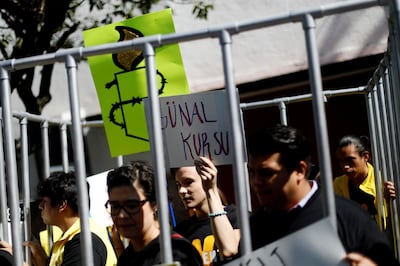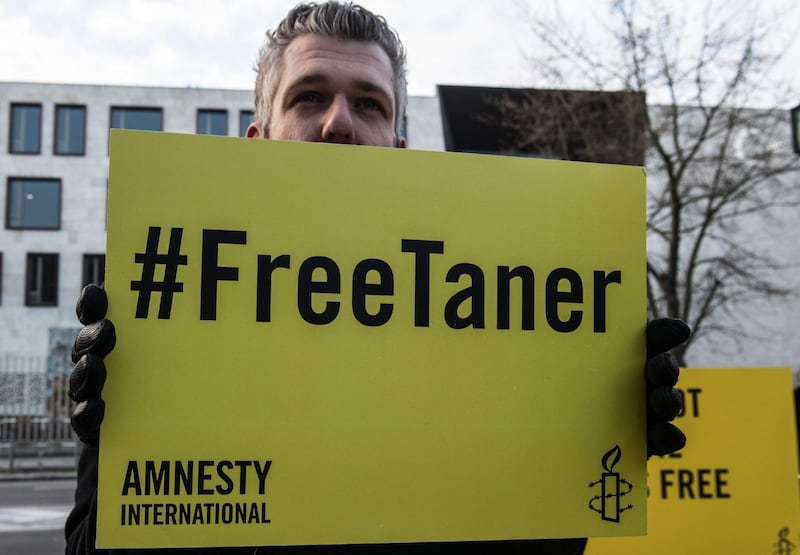Amnesty International on Wednesday set out to reinforce their efforts to win the release of its Turkey chairman who has spent a year in jail on "baseless" charges of links to the group blamed for a failed July 2016 coup.
Taner Kilic has been held since June 2017 in the western city of Izmir, accused of links to US-based preacher Fethullah Gulen who Turkey says ordered the coup. Gulen denies the accusation.
Mr Kilic is one of dozens of journalists and rights activists caught up in the crackdown launched under a state of emergency after the coup, which critics say has netted not just the suspected plotters but also opponents of President Recep Tayyip Erdogan.
"Today we mourn the year of Taner Kilic's life that Turkey's government has unjustly taken from him," Salil Shetty, Amnesty International's secretary general, said in a statement.
"But this is also a moment to redouble our efforts to secure his release and that of many other civil society activists whose work has cost them their freedom," Mr Shetty added.
Our colleague & friend #TanerKılıç has been unjustly jailed in #Turkey for one year today, a victim of the harsh crackdown on anyone who dares speak out. But nothing will stop us fighting for his freedom & that of others wrongfully detained. #FreeTaner! https://t.co/iCOMDEKYDE pic.twitter.com/Bnr0uVxHSW
— Salil Shetty (@SalilShetty) June 6, 2018
Mr Kilic was arrested on June 6, 2017, on what Amnesty describes as the "baseless charge of belonging to a terrorist organisation".
Authorities accused Mr Kilic of having an encrypted messaging application on his phone in August 2014 called ByLock, which Ankara claims was especially created for Gulen supporters.
His next hearing is set for June 21. If he is found guilty, he could face up to 15 years in jail.

Meanwhile on Tuesday night a Turkish court ordered the conditional release of a cartoonist after he was jailed for insulting President Erdogan, as the opposition launched a google advertisement campaign targeting the leader.
Nuri Kurtcebe, 69, was sentenced to serve a 14-month jail term. He was detained and sent to prison after security forces found him on a bus travelling in the north-western Turkish city of Yalova.
His lawyer, Erdem Akyuz, said that the tribunal ruled on Tuesday night that Kurtcebe be released on probation.
"My client Nuri Kurtcebe will resume his work, his drawings and his cartoons after having been deprived of his pencils and ink for two days," Mr Akyuz was quoted as saying by the Dogan news agency.
Mr Kurtcebe was handed the jail term last year for a number of caricatures he drew in 2015 but launched an appeal and remained free pending the ruling.
Mr Akyuz said earlier on Tuesday that the police were enforcing the sentence after an appeal was turned down by a top court. It was not clear in the ruling which cartoon had prompted the charges.
Mr Kurtcebe's daily drawings were published in the Aydinlik newspaper. His cartoons were also featured in Hurriyet and opposition Cumhuriyet newspapers as well as satirical magazine Girgir.
Turkey’s parliamentary and presidential elections are set to take place on 24 June, as Mr Erdogan is seeking a new mandate under the expanded power of a full executive presidency.
Nationalist opposition Iyi Parti’s (Good Party) Google advertisements campaign is led by party chief Meral Aksener, who split from Turkey’s main nationalist group after it formed an alliance with Mr Erdogan.
__________
Read more:
Turkish court orders release of two journalists pending trial
Turkey sentences journalists to life over failed coup
US-Turkey strained relations worsen in light of Ankara's re-arrest of Amnesty International official
_________
Google searches of certain keywords lead internet users to humorous messages redirecting them to the site of Iyi Parti.
A search for the ruling AKP (Justice and Development Party) returns a top result that leads to the message: "Now there's an even better one" a play on words associated with the Iyi Parti's name.
The campaign also targets the president’s hugely controversial palace in the capital Ankara, which it describes as a "1,150 room bargain palace".
A Google search for "empty rooms" leads internet users to Mr Aksener's campaign promise to open the vast palace to the public.
A search for "VPN" brings them to Iyi Parti's website with the slogan "Don't waste your money. For internet freedoms, wait until we come to power”.
Many Turkish internet users use a Virtual Private Network, sometimes paying for the service, to get around official blocks on certain websites in Turkey, such as Wikipedia.
Typing "dream interpretation" throws up a link which asks: "are you having nightmares?".
Google AdWords is Google’s advertising system in which advertisers bid on certain keywords in order for their advertisements to appear in the search engines results.







